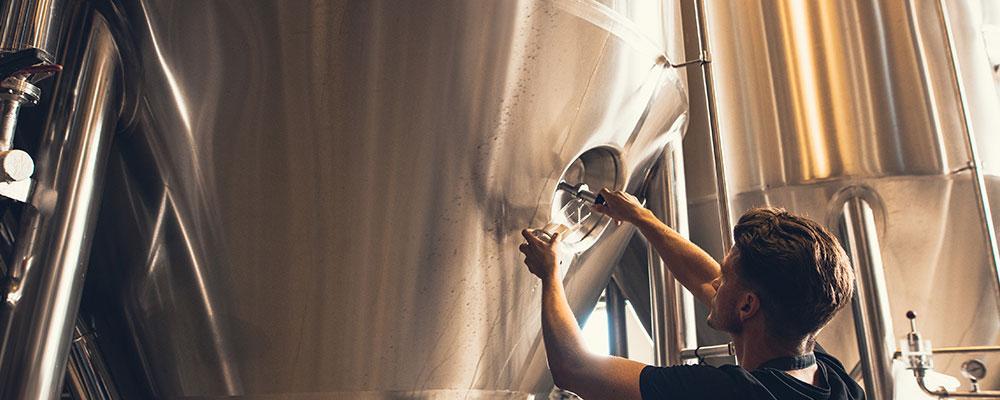Illinois Craft Liquor Manufacturer Licensing Lawyer

Chicago Licensing Attorney for Craft Brewers and Distillers
The craft alcohol industry has grown significantly over the past few decades, and many people who are passionate about making beer, liquor, or wine have been able to make a good living as craft manufacturers. However, anyone who is planning to operate this type of business must obtain the proper licenses, which can be a complex and confusing process. To ensure that you meet all of your legal requirements and address any issues that may arise when applying for licenses, it is crucial to work with an experienced liquor licensing lawyer.
Since 1987, the attorneys of Bahr Anderson Law Group, LLC have been working with alcohol-related businesses of all sizes and types throughout the state of Illinois. We can help you complete the license application process successfully, and we will work with you to put a road map in place that will ensure that you can accomplish your business goals.
Requirements for Craft Manufacturers
Liquor licensing uses a three-tier system, with separate licenses for manufacturers, distributors, and retailers. Typically, manufacturers are only allowed to sell the alcoholic beverages they create to distributors. Wholesalers, importers, and other types of distributors may then sell liquor to retailers such as taverns, bars, nightclubs, restaurants, or liquor stores, and only retailers may sell or serve alcoholic beverages to consumers.
Due to the small size of craft manufacturers, it may not be economically feasible to participate in this three-tier system. To ensure that smaller businesses have the opportunity to succeed, special types of licenses apply to craft manufacturers, and they may be allowed to sell liquor to retailers or consumers. These types of manufacturers include:
- Craft breweries - Depending on the amount of beer manufactured, a brewery may be eligible for either a Class 1 or Class 2 Brewer's License from the Illinois Liquor Control Commission (ILCC), and these licenses will allow for the sales of beer to distributors. A Class 1 Brewer's License allows for the manufacture of up to 930,000 gallons per year, and a Class 2 Brewer's License allows for up to 3,720,000 gallons per year. Holders of a Class 2 Brewer's License may also hold up to three Brew Pub Licenses, with each of these licenses allowing for the sales of up to 155,000 gallons per year to either distributors or consumers at a single location. Breweries will also need to obtain a Federal Brewer's Notice, and brew pubs will need to obtain a local liquor license.
- Craft distilleries - A distiller of alcoholic spirits may obtain a Class 1 or Class 2 Craft Distiller License from the ILCC. A Class 1 Craft Distiller License allows for the manufacture of up to 50,000 gallons per year, which may be sold to distributors, and up to 5,000 gallons may be sold to retailers. A Class 2 Craft Distiller License allows for the manufacture of up to 100,000 gallons per year, which may be sold to distributors. In addition, a Class 2 license holder may also hold a Distilling Pub License, and up to 5,000 gallons per year may be transferred to this pub and sold to consumers. A Distilling Pub License also allows for up to 5,000 gallons per year to be manufactured on the premises of the pub, and liquor may be sold to consumers for on-premises or off-premises consumption. Distilleries will also need to obtain a Federal Basic Permit, and distilling pubs will need to obtain a local liquor license.
- Wineries - While most winemakers are only allowed to sell wine to distributors, a Limited Wine Manufacturer License allows an Illinois winery to make sales and deliveries of up to 40,000 gallons per year to both distributors and consumers. These manufacturers may only use grapes, berries, fruits, honey, or vegetables that are grown or produced in the state of Illinois. Wine manufacturers will also need to obtain a Federal Basic Permit, and a local liquor license may be needed before wine can be sold to consumers. Any licensed winery of any class that makes less than 25,000 gallons per year may also apply for a Self-Distribution exemption to be able to sell not more than 5,000 gallons of wine to retail licensees.
Contact a Chicago Area Craft Liquor License Attorney
At Bahr Anderson Law Group, LLC, we can help your business understand and meet all of the necessary licensing requirements to manufacture and sell alcoholic beverages. To learn more about how we can help you complete the license application process and create a successful business plan, contact us at 630-462-1113.


 630-462-1113
630-462-1113






